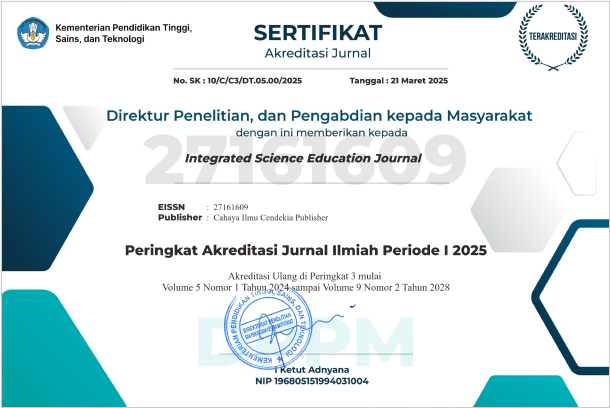Online Vs Offline: Comparison of Effectiveness of PhET Simulation and Science KIT in Junior High School
Abstract
Purpose of the study: This study aims to compare the effectiveness of online and offline simulation media. Especially during the transition period from the new normal, hybrid learning and back to the new normal.
Methodology: The research design used was quasi-experimental. The study sample was taken using a random sampling technique. The data collection techniques used are observation and tests. Observation is carried out to find out more about the subject of research. A trial is conducted to determine the condition of students before and after receiving treatment. There are two test instruments used, namely pretest and posttest. The treatment given to the control class is learning using Science KIT, and the experimental class will use PhET Simulation. The results of the study will be processed using SPSS.
Main Findings: PhET media and science KIT based on the N-gain test proved to increase on average after treatment. In the control class, the gain value was 0.7, while the gain value was 0.8 in the experimental class. According to the criteria, both classes are in the high category. but in contrast to the percentage of effectiveness, the use of PhET is effective with a rate of 86%, while KIT science is quite practical with a ratio of 71%.
Novelty/Originality of this study: PhET simulation media and science KIT can explain abstract material to improve cognitive understanding. The use of this simulation media can be adjusted to learning conditions. if offline, use KIT, and if online, use PhET.
References
P. H. Garland And T. W. Grace, New Perspectives For Student Affairs Professionals: Evolving Realities, Responsibilities And Roles. Ashe-Eric Higher Education Report No. 7. Eric, 1993.
D. Rotatori, E. J. Lee, And S. Sleeva, “The evolution of the workforce during the fourth industrial revolution,” Hum. Resour. Dev. Int., vol. 24, no. 1, Pp. 92–103, 2021.
T. Sharhun And A. Potseluiko, “Linguistic and humanitarian competence of future engineers: the philosophical and anthropological aspect,” Hum. Stud. Ser. Pedagog., vol. 0, no. 10/42, pp. 122–132, 2020, Doi: 10.24919/2413-2039.10/42.199852.
A. Fadhil, A. Hakam, M. Effendi, S. Nurpratiwi, And A. Amaliyah, “Socio-Cultural revitalization, as an effort to empower the character of humanism in students,” 2022, Doi: 10.4108/Eai.15-9-2021.2315570.
M. Thees, S. Kapp, M. P. Strzys, F. Beil, P. Lukowicz, And J. Kuhn, “Effects of augmented reality on learning and cognitive load in university physics laboratory courses,” Comput. Human Behav., vol. 108, pp. 106316, 2020.
B. Fauth Et Al., “The effects of teacher competence on student outcomes in elementary science education: the mediating role of teaching quality,” Teach. Teach. Educ., vol. 86, pp. 102882, 2019.
G. Falloon, “Using simulations to teach young students science concepts: an experiential learning theoretical analysis,” Comput. Educ., vol. 135, pp. 138–159, 2019.
L. Kartina And S. Subani, “Analisis kemandirian siswa mts pada mata pelajaran ipa,” Schrödinger J. Phys. Educ., vol. 1, no. 1, pp. 30–35, 2020.
M. Amaliyah, I. N. Suardana, And K. Selamet, “Analisis kesulitan belajar dan faktor-faktor penyebab kesulitan belajar ipa siswa smp negeri 4 Singaraja,” J. Pendidik. Dan Pembelajaran Sains Indones., vol. 4, no. 1, pp. 90–101, 2021.
P. M. Kurup, X. Li, G. Powell, And M. Brown, “Building future primary teachers’ capacity in stem: based on a platform of beliefs, understandings and intentions,” Int. J. Stem Educ., vol. 6, no. 1, pp. 1–14, 2019.
Y. N. Rahayu, R. Rosyadi, U. C. Barlian, And S. Sauri, “Analisis standar penilaian pada pendidikan menengah atas: studi literatur review,” Gema Wiralodra, vol. 12, no. 1, pp. 17–33, 2021.
F. C. Dewi And T. Yuniarsih, “Pengaruh lingkungan sekolah dan peran guru terhadap motivasi belajar siswa,” J. Pendidik. Manaj. Perkantoran, vol. 5, no. 1, pp. 1–13, 2020.
H. Fauhah And B. Rosy, “Analisis model pembelajaran make a match terhadap hasil belajar siswa,” J. Pendidik. Adm. Perkantoran, vol. 9, no. 2, pp. 321–334, 2021.
S. Maulidina And Y. B. Bhakti, “Pengaruh media pembelajaran online dalam pemahaman dan minat belajar siswa pada konsep pelajaran fisika,” Orbita J. Kajian, Inov. Dan Apl. Pendidik. Fis., vol. 6, no. 2, pp. 248–251, 2020.
S. R. Muzana, S. P. W. Lubis, And W. Wirda, “Penggunaan Simulasi Phet Terhadap Efektifitas Belajar Ipa,” J. Dedik. Pendidik., Vol. 5, No. 1, Pp. 227–236, 2021.
L. Puspitasari, S. Subiki, And B. Supriadi, “Pengaruh media phet simulation terhadap motivasi dan hasil belajar fisika siswa smk,” J. Pendidik. Fis, vol. 11, no. 2, pp. 89–96, 2022.
D. A. Basri, “Implementasi simulasi phet (physics education technology) dan kit ipa terhadap keterampilan proses sains peserta didik sma negeri 6 Pinrang,” J. Sains Dan Pendidik. Fis, vol. 15, no. 3, pp. 319111, 2020.
I. Khoiriyah, U. Rosidin, And W. Suana, “Perbandingan hasil belajar menggunakan phet simulation dan kit optika melalui inkuiri terbimbing,” J. Pembelajaran Fis, vol. 3, no. 5, 2015.
M. Marlinda, A. Halim, And I. Maulana, “Perbandingan penggunaan media virtual lab simulasi phet (physics education tekhnology) dengan metode eksperimen terhadap motivasi dan aktivitas belajar peserta didik pada materi kelarutan dan hasil kali kelarutan,” J. Pendidik. Sains Indones., vol. 4, no. 1, 2016.
J. W. Creswell And J. D. Creswell, Research Design: Qualitative, Quantitative, And Mixed Methods Approaches. Sage Publications, 2017.
S. Sugiyono, Metode Penelitian Pendidikan (Pendekatan Kuantitatif, Kualitatif, Dan R&D). Bandung: Alfabeta, 2017.
S. Sugiyono, Metode Penelitian Kombinasi (Mixed Methods). Bandung: Alfabeta, 2018.
E. Lacka, T. C. Wong, And M. Y. Haddoud, “Can digital technologies improve students’ efficiency? exploring the role of virtual learning environment and social media use in higher education,” Comput. Educ., vol. 163, pp. 104099, 2021.
W. Alannasir, “Pengaruh penggunaan media animasi dalam pembelajaran ips terhadap motivasi belajar siswa kelas Iv Sd Negeri Mannuruki,” J. Educ. Sci. Technol., vol. 2, no. 2, pp. 81, 2016.
W. A. D. Pamungkas And H. D. Koeswanti, “Pengaruh penggunaan media pembelajaran video terhadap hasil belajar siswa sekolah dasar,” J. Ilm. Pendidik. Profesi Guru, vol. 4, no. 3, 2021.
S. Sylviani, F. C. Permana, And R. G. Utomo, “Phet simulation sebagai alat bantu siswa sekolah dasar dalam proses belajar mengajar mata pelajaran matematika,” Edsence J. Pendidik. Multimed., vol. 2, no. 1, pp. 1–10, 2020, Doi: 10.17509/Edsence.V2i1.25184.
N. N. Simamora, H. Safitri, H. Syiarah, And D. Chen, “Deskripsi motivasi belajar fisika kelas x mipa di sma negeri 4 Kota Jambi,” Integr. Sci. Educ. J., vol. 3, no. 1, pp. 1–5, 2022, doi: 10.37251/Isej.V3i1.166.
Z. M. Mardhatilla, “Phet simulation sebagai penunjang pembelajaran ipa secara online selama pandemi covid-19,” In Pisces: Proceeding Of Integrative Science Education Seminar, 2021, vol. 1, no. 1, pp. 441–448.
H. C. Mahardika, R. Ismawati, And R. Rahayu, “Penerapan lkpd berbantuan simulasi phet untuk meningkatkan motivasi dan hasil belajar kognitif ipa peserta didik smp,” Edu Sains J. Pendidik. Sains Dan Mat., vol. 10, no. 1, Pp. 61–70, 2022.
A. Susilawati, Y. Yusrizal, A. Halim, M. Syukri, I. Khaldun, And S. Susanna, “The effect of using physics education technology (phet) simulation media to enhance students’ motivation and problem-solving skills in learning physics,” J. Penelit. Pendidik. Ipa, vol. 8, no. 3, pp. 1166–1170, 2022.
M. G. Saudelli, R. Kleiv, J. Davies, M. Jungmark, And R. Mueller, “Phet simulations in undergraduate physics: constructivist learning theory in practice,” Brock Educ. J., vol. 31, no. 1, 2021.
Z. Akdemir And N. S. Rebello, “Door-Alarm lab: Integration of engineering design in a simulation-based learning environment for pre-service elementary teachers,” In 2022 Asee Annual Conference & Exposition, 2022, pp. 1–12.
Copyright (c) 2023 Firda Nikmah, Maison Maison, Syamsurizal Syamsurizal

This work is licensed under a Creative Commons Attribution-NonCommercial 4.0 International License.
Authors who publish with this journal agree to the following terms:
- Authors retain copyright and acknowledge that the Integrated Science Education Journal is the first publisher licensed under a Creative Commons Attribution 4.0 International License.
- Authors are able to enter into separate, additional contractual arrangements for the non-exclusive distribution of the journal's published version of the work (e.g., post it to an institutional repository or publish it in a book), with an acknowledgment of its initial publication in this journal.
- Authors are permitted and encouraged to post their work online (e.g., in institutional repositories or on their website) prior to and during the submission process, as it can lead to productive exchanges and earlier and greater citation of published work.







.png)
.png)






